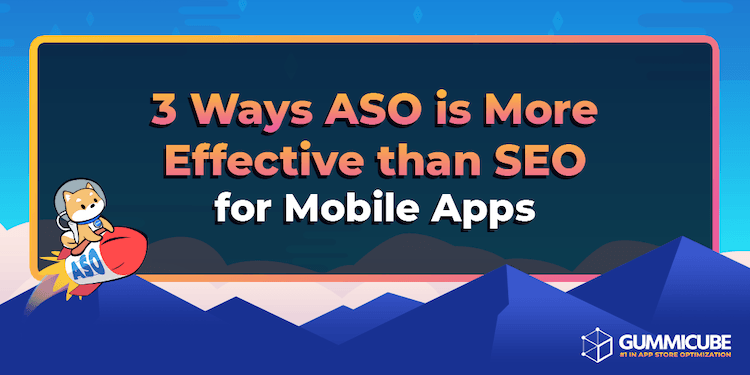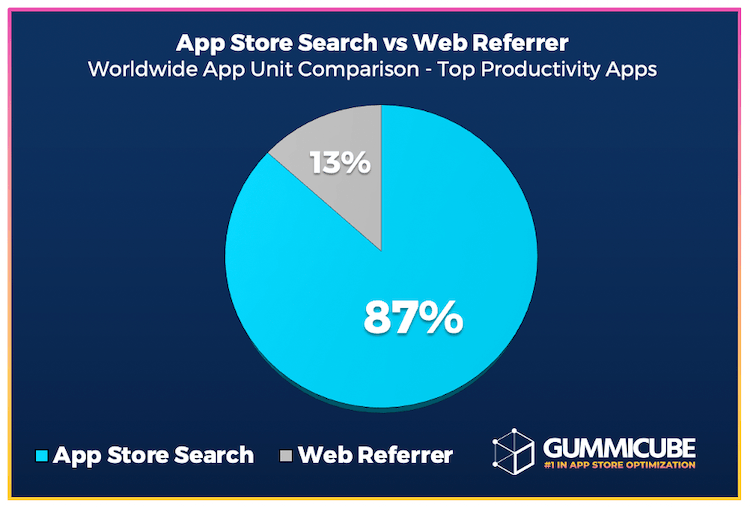
When you want users to find a website, you use Search Engine Optimization (SEO). So when you want users to find an app, will the same tools and tactics work? They’re both search engines, right?
A common mistake that new app developers make is to assume SEO will work for mobile apps as well as it does for web pages. In reality, there are several differences between searching for web pages and searching for apps that developers need to consider. This is why App Store Optimization, not Search Engine Optimization, is more effective for mobile apps.
What makes the two different? Why is ASO so much more effective? There are several reasons why.
Reach More Users
First and foremost, App Store Optimization is focused on improving visibility where the most users find apps. Users don’t go to a web search engine when they want to find a mobile app – they search directly in the App Store or Google Play Store.
Breakdown of aggregate worldwide App Units comparing App Store Search to Web Referrer for top apps in the Productivity category
Apple has stated that the majority of users – 70%, in fact – discover apps through organic search in the App Store, a trend that has remained consistent ever since it was reported in 2017. This means that ASO helps you optimize for the area where more engaged users are, resulting in a larger potential to acquire users than implementing an SEO-based strategy.
Given the importance of organic visibility in the app stores, it’s the first thing developers will want to optimize for. When developers update their app metadata, the stores’ algorithms will begin to merchandize it for the keywords and phrases it’s relevant for and rank the app for those terms. This will help it appear to users through those search queries directly in the store.
SEO is focused on search, but only as it relates to the web. This has little to no impact on organic App Store or Play Store rankings.
Rank for More Keywords
A key aspect of App Store Optimization is helping an app rank for as many relevant keywords as possible. This can range from hundreds to even thousands of keywords, depending on the app, its category and its features. On the other hand, SEO strategies typically have 3-5 primary focus keywords.
Being able to rank for multitudes of keywords through ASO can help put an app in front of more users in the stores. This enables developers to reach out to more target audiences based on their features, category, app type and so forth.
The wide range of keywords opens up more avenues for an app to be seen and deemed relevant to a user’s needs. This can help increase the chances of an app gaining downloads and boosting its ranking far more than targeting a handful of keywords through SEO.
It’s important to note that the strategies used to execute a successful SEO campaign simply do not apply to ASO. Search semantics and volume on the app store are not the same as the web, there is a difference in the amounts of terms that can be successfully targeted, and the components that drive conversion are inherently different due to how they are presented. A well-researched and executed ASO strategy specifically for the app stores is critical for success.
A well-executed ASO strategy not only allows you to target more keywords but allows you to index for them in an area where more users are looking for mobile apps.
Get Results Faster
When you begin optimizing, how long do you expect it to take? When you update your keywords, it can take approximately 3-4 weeks to index for them. If the ASO strategy is also utilizing external paid marketing from quality channels, this can help accelerate the process.
On the other hand, SEO can take much longer to yield results – it can take roughly 180 days for SEO to show a consistent impact on web visibility.
Since SEO can take a significant amount of time, it can be hard to utilize an effective strategy. App developers need to be able to update quickly to capitalize on new trends, seasonality, added features and so on. If they have to wait six months to index, it can slow down the entire business model. Since ASO indexes at a faster rate, it helps get apps visibility much faster.
Between the pool of engaged users, potential to rank for search terms and the amount of time it takes to index on them, ASO is a far more efficient mobile app marketing strategy.
Overall
What would you prefer to use for marketing your app – a strategy that can quickly target hundreds of keywords in the areas where users are searching, or a strategy that targets 3-5 keywords over the course of half a year, in areas where users typically don’t search for apps? The choice is clear.
ASO is not SEO for apps – it’s an entire strategy built around organic search optimization, conversion optimization and paid user acquisition. The benefits from organic search discovery from ASO are enough on their own to outweigh the benefits of a successful SEO campaign if you want to get your app discovered and downloaded. App developers that use App Store Optimization properly can target users and gain visibility far more efficiently than those that try to use SEO.











